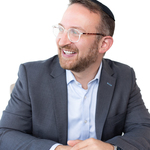I received quite a few thoughtful responses to my article on Postmodern Orthodoxy last week and read though many more that were posted online. The conversations were healthy ones and I hope that we, as a community, can continue to challenge each other li-shem shamayim.
One very incisive and insightful email I received, came from an American student currently in Israel for shanah bet at a Yeshivat Hesder. In reading it I realized that my essay may have prompted others - particularly those post-high school students who are beginning their journeys of self-definition and denominational identity - to ask very similar questions. I thought, therefore, that it might be worthwhile to share his questions, as well as my response, a bit more broadly.
Both are copied verbatim below:
Question:
...I had a few questions on the subject that I was wondering if you could answer. I'll preface them by saying that I am far from sufficiently knowledgeable about the thoughts of R' Shagar and R' Lichtenstein, or the nuances of modernist versus postmodernist philosophy, so I apologize if I am operating on faulty premises or misunderstanding.Firstly, regarding the underpinnings of Modern Orthodoxy and the consequences they have for our outlook on Postmodernism. In your opinion, was Modern Orthodoxy considered by its leaders to be the "ideal" Judaism throughout all of Jewish history, but only able to be fully developed and articulated with the onset of Modern thought and philosophy? Or was Modern Orthodoxy only a response to the various conflicts with Judaism brought about by the inception of Modern ideas? The נפקא מינה for this question is as follows: in light of society's evolution from Modernism to Postmodernism, should our community hold fast to our Modern Orthodox roots in the face of a changing world, or adapt alongside the shift to Postmodernism and react accordingly?Secondly, if you believe the latter to be true, is the development of Postmodern Orthodoxy a necessary change, a welcome change, or both?I'm sure you are currently fielding a lot of commentary on this right now in addition to the rest of your responsibilities, so please take your time in responding to this...
...I think the answer to your questions lies in how we use the term Modern Orthodoxy. MO is often used to refer to a set of values: engagement with secular culture, the religious significance of medinat Yisrael, ritual / intellectual opportunities for women, engagement with non-Orthodox Jews, etc. In that respect, I would answer your first question with an unqualified “yes.” The leaders of MO, starting perhaps with Rav Hirsch, saw the Post-Enlightenment western world as a newfound opportunity to bring these Torah ideals into practice on a wide scale (though they could point to precedents set by the Rambam, Ibn Ezra, Yehuda HaLevi, Abravanel, the GRA and others, to demonstrate their deep roots in our mesorah). And, yes, I believe those were enhancements and expansions of Torah Judaism that are here to stay.Rav Shagar, and by extension my essay, isn’t speaking to any of that. He is speaking to the philosophical underpinnings of Torah Judaism in general and here I think it would be hard to make a similar argument. The Torah - both Torah she-bichtav and Torah she-ba’al peh - contains very little of its own philosophy. It is a work of Divine law first, theology second, and philosophy is a very distant third. As a result, throughout history our best thinkers have looked to the general philosophy of their day for tools to explain Torah ideas and concepts. Whether it was Rav Saadya Gaon’s use of Greek rationalism (mediated through Islamic Kalam), Rambam’s use of Aristotelianism, Rav Hirsch’s use of German Idealism or the Rav’s use of neo-Kantian existentialism, these tools have clearly changed with time and none can be considered “the ideal.” Each added insight, each focused on a relatively unique set of questions, each responded to the challenges of its day, each spoke the language its generation understood. My essay argues that in that respect, the time has come to evolve once again.Would Rav Aharon and the Rav have embraced Postmodernism? The answer is no. But the Rambam wouldn’t have embraced Kant and Rav Saadya wouldn’t have embraced Averroes either. That doesn’t make any of them wrong, it simply makes them human.With the unprecedented rate of change in our world today, I fully expect that Postmodernism won’t be sufficient for your children and that they are going to need yet another set of tools to bring Torah to life within their world and to reconcile it with their society’s worldview. My argument is that we had better get started developing those tools if we are going to keep pace.Hope that helps and feel free to share these thoughts with anyone else you think might be interested...
CEO of the Ades Family Foundation. Founding Head of School of the Jewish Leadership Academy. Fascinated with the Jewish future.
